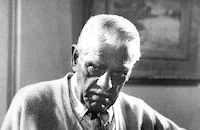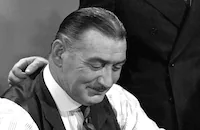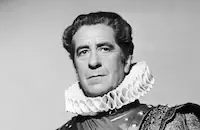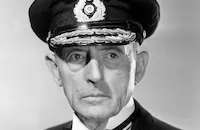Devil's Island

Brief Synopsis
Cast & Crew
William Clemens
Boris Karloff
Nedda Harrington
James Stephenson
Adia Kuznetzoff
Rolla Gourvitch
Film Details
Technical Specs

Synopsis
Dr. Charles Gaudet, who has been convicted of treason for treating a wounded escaped convict, is sentenced to Devil's Island, where he is subjected to the cruelty of the sadistic commandant, Colonel Armand Lucien and is condemned to hard labor. During an attempted escape by the convicts, Lucien's little daughter Collette suffers a fractured skull, and only Gaudet, a skilled brain surgeon, can save her life. The doctor has been condemned to death for his role in the escape, and consequently, Lucien offers Gaudet his life for that of Collette. Gaudet agrees to Lucien's terms, but after saving the little girl's life, the doctor is ordered to the pit by Lucien. This angers Madame Lucien, who in gratitude for her little girl's life, plots the doctor's escape. With bribes provided by Madame Lucien, Gaudet and his compatriots escape the island aboard a small boat. When the craft runs out of fuel, however, the fugitives are picked up by a convict ship and returned to the island, where Lucien sentences Gaudet to death. Learning of the doctor's fate, Madame Lucien hurries to the mainland and pleads for Gaudet's life with the newly appointed minister of the penal colonies. Having discovered Lucien's reign of graft and corruption, the minister returns to the island with Madame Gaudet where, after pardoning Gaudet, he arrests Lucien for misconduct and promises to institute reforms.

Director
William Clemens
Cast

Boris Karloff
Nedda Harrington

James Stephenson
Adia Kuznetzoff
Rolla Gourvitch
Will Stanton

Edward Keane

Robert Warwick
Pedro De Cordoba

Tom Wilson
John Harmon
Richard Bond
Earl Gunn
Sidney Bracy
George Lloyd
Charles Richman
Stuart Holmes

Leonard Mudie
Egon Brecher

Frank Reicher
Alan Bridge
Ben Hendricks
Earl Smith

Harry Cording
Galan Galt
Frank S. Hagney
Douglas Williams
Henry Otho
Stanley King
James Blaine
Dick Rich
Sol Gorss
Don Turner
Alonzo Price
Walter Soderling
Glen Cavender
Cliff Saum
Davison Clark
Nat Carr

Paul Panzer
Neil Clisby

Jack Mower

Lawrence Grant
Theodor Von Eltz
Earl Dwire
Eddie Foster
Dick Botiller
Francis Sayles
Billy Mcclain
Jack Wise
Jack Richardson
Crew
George Barnes
Anthony Coldeway
Bryan Foy
Kenneth Gamet
John Langan
Robert B. Lee
Arthur Lueker
Frank Magee
Max Parker
Don Ryan
Raymond L. Schrock
Louis Van Den Ecker

Film Details
Technical Specs

Articles
Devil's Island
Strangely enough, the Raft part was then handed to Boris Karloff as part of his three picture deal. After appearing in the 1936 horror gangster hit, The Walking Dead, Karloff, weary of always playing the monster, expressed delight in being offered the role of a genuine human being. Actually, Warners had planned to feature the popular actor in Witches Sabbath, but abandoned the project due to the sudden decline in the horror film market. Also, Karloff needed to be put in a property quickly, or Warners would have to exercise the "pay or play" clause in his contract.
With the topicality of Devil's Island threatening to be lost with continuing delays, the now vastly re-written lead of Charles Gaudet was tailored for Karloff, and handed off to Bryan Foy's efficient B-movie unit, thereby assuring an early 1939 release. Prolific editor-turned-director William Clemens, one of the key players in the Warners B-picture stable, was then assigned the job of helming Devil's Island. Known for his fast-paced no-nonsense thrillers, Clemens also directed the slick Nancy Drew mysteries. Later, moving to RKO, the director would film the best of the lively Falcon series. Benefiting from leftover The Life of Emile Zola sets, as well as those under construction for upcoming Warner "A" items, including The Letter and Tropic Zone (both 1940), Devil's Island certainly belies its modest budget. The assigning of master cameraman George Barnes was yet another plus, and his bravura lighting and expressionistic compositions are spectacularly apparent throughout. The film also shares many similarities with The Prisoner of Shark Island (1936), directed by John Ford, in that the main character, Dr.Gaudet, is also sentenced to hard labor on Devil's Island for aiding a traitor.
With shooting completed, Devil's Island was quickly pushed into theaters - and into controversy. The French government, now down playing the sadistic brutalities of the hellish atoll, beseeched the studio to shelve the movie as they wanted to avoid any further reminders of the institution and it's inhumane practices. Fearful of losing the profitable foreign market, Warners reluctantly agreed, shearing several sequences, and adding a treacly prologue. However, by mid-1940, with France and most of Europe under Nazi rule, the international exchange had dried up to the point of non-existence. Devil's Island hit theaters on July 11th, 1940, becoming a modest moneymaker for the studio, thanks to positive support from The New York Times, who heralded the 62 minute programmer as "...pull(ing) no punches..." and being "...savagely realistic."
Producer: Bryan Foy
Director: William Clemens
Screenplay: Anthony Coldeway (story), Raymond L. Schrock (story), Kenneth Gamet, Don Ryan
Cinematography: George Barnes
Film Editing: Frank Magee
Original Music: Howard Jackson (uncredited), Max Steiner (uncredited)
Principal Cast: Boris Karloff (Dr. Charles Gaudet), Nedda Harrigan (Madame Lucien), James Stephenson (Colonel Armand Lucien), Adia Kuznetzoff (Pierre), Rolla Courvitch (Collette).
BW-62m.
by Mel Neuhaus

Devil's Island
Quotes
Trivia
Notes
According to the Variety review, this picture, released in 1939, brought massive protests from the French government for its depiction of the French penal colony. Fearing trouble for the French market, Warner Bros. withdrew the picture from world-wide distribution until the advent of the war, when the French market was no longer viable.















